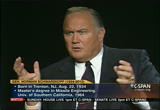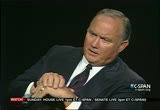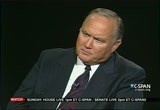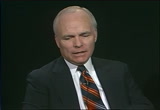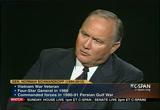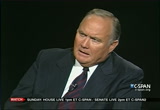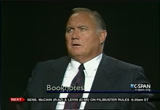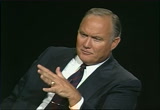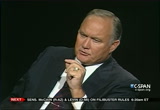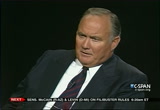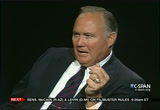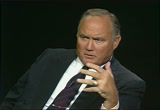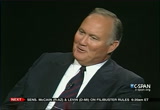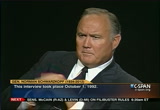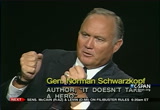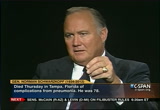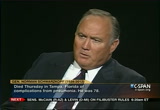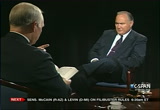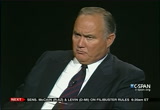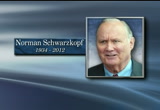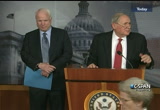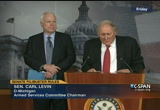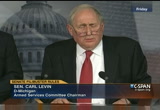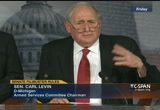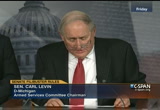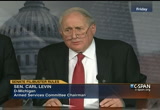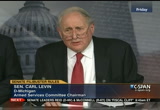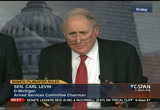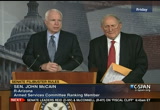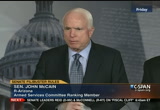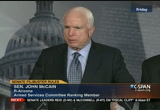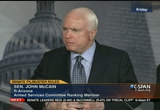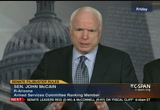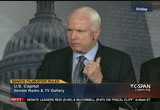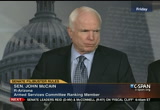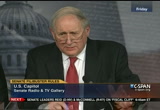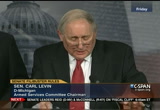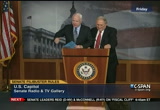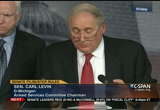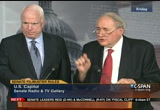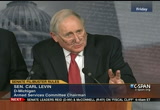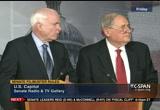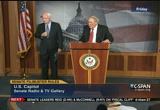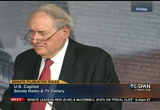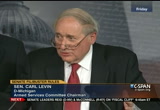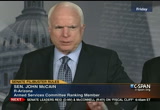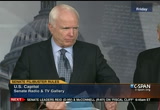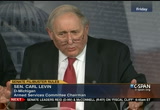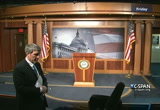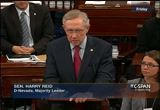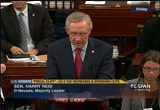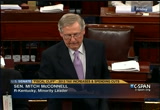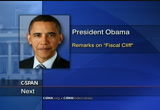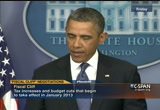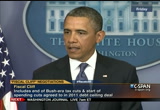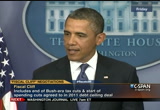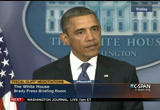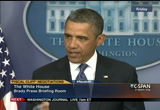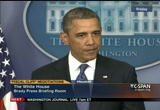tv Politics Public Policy Today CSPAN December 29, 2012 6:00am-7:00am EST
6:00 am
>> did the pentagon have review? >> no, didn't have fop once i'm retired from active due any i don't have to submit it to the pentagon unless i use classified information. so i avoided using any classified information but a lot of stuff was declassified right after the war. a lot of stuff was a matter of public record. so i had a great deal of material. the best thing i had was this, any war i ever fought most of instructions were sent by message back and forth. so you have hard copy record of every decision made. because of where we are today most of the orders and instructions are seventh back and forth by secured telephone. it became apparent that we're not going have a record of the decisions made unless we have a record ourselves.
6:01 am
any time i had a conversation i wrote down what i said and what is being said to me. i had someone in there who would write down every time i made a decision and he would log it into a private journal that we kept of every decision that was happening during the war. if it had not been through that the book would not be written. >> where are those 3,000 pages? >> they are mine. they are my private property. >> what are you going to do with them? >> i'm probably going to donate them to army war college archives, or something like that, asked that they be placed there and at the end of 10 years someone is going to have a ball and write the next version of a book. >> what are you going to do with the hundreds of hours of tapes? >> i have them at home.
6:02 am
>> donate them too? >> put them together in one package. i have to tell you something, five years ago i did not have any papers. one of the collections i have at home is all the stuff i saved from granada. the map i carried around with me became the planning map, the enemy map that we captured that showed us where the enemy was that became our prime piece of intelligence. a lot of the briefing slides that i used after granada to give talks about what happened i have all of that stuff at home. i kept that together it was the principle source i used for the chapter on granada. then you send messages to the general and you accumulate stuff.
6:03 am
when you leave you find some secretary kept all of that and filed it and she gives it to you. i took all of that stuff and put it in boxes and put it in the garage. i thought one of these days i will have to sort through this and throw it away. it will cost me a fortune to move to my next house. now, that is the -- now people want it. people say i would love to have all the stuff you have accumulated over the years. some of it, i don't know how they are going to make any sense of some of it. i'm left happened and my hand writing is not that great. >> you start off your book by saying you want to copy the u.s. grant memoirs, a two volume set. then yours became more emotional than his. how many you did one volume and how many emotional?
6:04 am
>> i will tell you why. first of all, grant is an interesting character. he refused to write his memoirs for years and years. finally he went bankrupt once again and found out he was dying and it kind of happened at the same time. he tells us at the front of the memoirs the only reason i'm writing this is because i went bankrupt again and i want to leave an estate for my family and they are offering me money. he is up front about it. >> when did you like him? >> he was a dirty boot soldier. >> when was he a soldier? >> he was a soldier long before the -- long before he was known to the american people as the leader of the union army. he was out doing great things. grant is interesting. he was a success awful a
6:05 am
soldier then a failure as a soldier then he was a success at a businessman. he hung in there. he was one of the most effective -- without a lot of press coverage and that sort of thing he was just out winning battles. that wonder line that lincoln said when he was talking about grant the guy out west winning all of these battles. someone said he is nothing but a drunk. lincoln said well, find out what whisky he drinks and i will send it to all of my troops. grant was a passionate man, cried many times and yet, still prevailed. he understood the meaning of, you know, apply the maximum
6:06 am
force to get it over as fast as you can because that is how you limit your casualties. >> you say back in december when secretary chaney came to visit you before the battle started in february that he brought with him a copy of the 11 part series on the civil war. all you generals watched it over there. not everyone of them but your group. why did you watch the series and what impact did it have on your think something >> i heard about it back in the state. the first time i started watching was for entertainment. we at that time, we worked seven days a week and we were working a 16-hour day. people were getting ground into the dirt and my chief of staff came to me and said we have to give the troops a break.
6:07 am
so we devised a system, friday was a holy day and the day of rest we decided that one day a week we would break as many people as we could. what that did was allow them to kick back on thursday night, go out, sleep in on friday morning and we come to work at noon. left me without anything to do on thursday night. the first time i watched this program was one of those thursday nights. i heard what a wonderful series it was and all of a sudden, you know, it was -- we were in the process of planning this campaign. it was going to involve hundred of thousands of lives and what you are doing is viewing other campaigns that involved hundreds of thousands of lives. to me, it took on an almost real life dimension.
6:08 am
when they were reading the words of sherman, reading the words of grant, or stonewall jackson or the words of robert e. lee many of these emotions that i was feeling at the time. so it almost became hypnotic. there were so many hours you can watch so i didn't watch anymore for another week. then the next week i think i watched at least two of those tapes and sometimes three. i was mezmorized by the whole thing. >> did it impact the decisions you were make something >> not directly but it certainly attuned my brain to once again the horrors of war and this is human life you're dealing with. this is not moving military
6:09 am
symbols around a map. it became very much of an emotional experience as well as a business experience, if you want to call it that. >> another thing you say in the book that had an impact on you is seeing the broadway show "ben franklin in paris." why? >> i volunteered to go to vietnam, it was an advisory effort, it was not leading u.s. combat troops. a lot of people told me i was crazy. what are you doing this for? there is no career enhancement for you going over there and advising them and that sort of thing. i told them they don't understand. it is a sense of duty. i'm an instrument of war. i was not articulating my possession well. -- my position very well.
6:10 am
then i saw "ben franklin in paris" and this wonderful last scene where ben franklin stands up about how will i find those americans then. will they love liberty given it to their crib for nothing. if you are not free you are lost without hope. and are they willing to die for it? that is one question that you have to ask, are you willing to die for it and the answer must be, yes, sir, i would. that is why i was going to vietnam. i have never forgotten those words. >> there's another point where you talk about the civilians in washington seeing too many rambo movies. >> there was an element pressuring, i felt, for us to take action when we were not prepared to do that.
6:11 am
and that, frankly, as early as november, i was called mccollum. >> general george mccollum. >> yeah, because they saw a civil war series where he sits outside and won't attack lee. so schwarzkopf was referred to him. >> who is they? >> i don't know. i mean it. everyone comes after me and says name names. you know why i don't know name? because colin powell had the good sense not to give it to me. people in the national security counsel i don't know if -- colin was relaying to me what was going on in washington. we were trading information back and forth. when this came up i got burned. this guy who watches the pbs series and he is operations --
6:12 am
schooled in the operational arts and is going to explain to schwarzkopf how to run war. this guy is so stupid. there is a big difference. he had outnumbered lee 10:1 and at the time we were outnumbered 3:1. i said to colin, i said who is the s.o.b. who said this i want to know? colin had the great wisdom to say no, just for get it. you don't need to know who it was. you worry about what is going on out there and i will worry about what is going on here in washington. everyone is convinced i know who it is and they bring up names was it so and sew? i don't know. >> i think it was your daughter who said to you on the phone,
6:13 am
norman schwarzkopf if you die i will never speak to you again. >> that was my wife. >> what is that story? >> the night the war was supposed to start, the decision was made 48 hours, i needed 48 hours -- we needed 48 hours to get everything rolling, to get the airplanes in the air, get the bombers loaded up, get the refueling set up. we needed 48 hours. after the january 15 deadline we got the word ok, it is a go. then you put all of that being in motion then there is nothing you do. you sit there. the night before the war was about to begin about 11:00 or 12:00 at night i did what most people do. i sat down and wrote a letter to my family. by this time, we heard all the stuff about chemical missiles
6:14 am
and we did not know if they were going to fire chemical missiles and we were going to have mass casualties. we did not know what was going do happen. even though i talked to them on the phone, twice a week, it was important for me to sit down and write a letter to my family and tell them how i felt about them. i wanted them to know that at the last minute they were important to me. they were the last thing in my mind before this war started. i don't know why. it is amazing how many people i talked to who did the same thing. i wanted them to have this piece of paper so when they were 25, 30, 40, or whatever and their father was killed and could pull out this paper and know their father -- so i wrote a letter and it is very emotional letter. i put in the book and only did that after i asked my wife's permission to do that and i wrote this letter.
6:15 am
then the war started. about two weeks later, three weeks later i call up one night and brenda was in tears. i said oh, my god, what is wrong? i thought something happened to the kids or to my dog. she just got the letter. it took that long for her to get it. i got your letter here and norman schwarzkopf if you get killed i will never speak to you again. >> is there anything in this book that you regret you put out there? that you wish you pulled back? >> i don't think so. unfortunately, with this a book like this people will go out and pull something out of context. people pulled out the one time i spoke about this dramatic moment right before the ground war was about to begin, when colin powell was under pressure back there, i was under pressure
6:16 am
by my commanders and we were debating, the weather was turning lousy and we were debating wait two days or not. that's the one thing that everybody grabbed out of context. but i did that because -- if this book is going to be any value at all to future military people, to students, it has to be honest. what it has to show is that it is a torturous process coming up with the decisions that involves the lives of hundreds of thousands of people. it is not simple. all war movies make everything look so easy. this guy comes in and says let's go toward then we go toward. that is not how it goes. you get input from everywhere and people up and down the line have to make very, very tough
6:17 am
calls and that is why that is in there. if it is read within the context that goes before and comes after it does not seem quite dramatic. read by itself it is very significant. >> we have a short time left but i want to end it with what you found when you were in vietnam in 1965. this is a document that you quote and it says -- this is a document i assume to the troops? >> the enemies captured this thing. showed it to one of my american advisors and he brought it to
6:18 am
me and said look at this thing, look at what people have in their hands. >> it says "i know you are facing more and more americans but don't worry. we're going to win the war the same we won against the french. the american people are not tough enough to see the this war threw and we are. we can fight another 20 years and before then they will give up and not support their troops anymore and we will claim victory." did you carry that around with you? >> not >> was it in the back of your head all the time? >> sure it was in the back of my head. the one thing i thought about was are we getting involved in something that america can't support.
6:19 am
when i went to desert storm it was a concern. american public opinion was going like this and there was a bunch of congressman coming out against what was going on and this sort of thing. i just thought the worst possible thing that could happen to us is being over here halfway around the world in the middle of nowhere and not have the support of the american people. but the american people said not this time. we got over there and we got 100 tons of mail a day. by christmas we got 400 tons of mail a day from people all over saying as long as you are there we support you. we don't blame you for this war.
6:20 am
>> coming up, the filibuster in the senate followed by the list on the fiscal cliff negotiations from capitol hill. first, harry reid and mitch mcconnell and then remarks from president obama at the white house. also, yesterday, senators carl levin john mccain of for their ideas for bypassing the bill buster to -- it would change the senate rules to assemble a majority vote. they spoke for about half an hour. [captioning performed by national captioning institute] [captions copyright national cable satellite corp. 2012] ok, sorry for the delay. we thought we had a vote, but there was no vote. senator mccain and i are part of a group of eight senators who have been working for about a month to come up with a proposal for our leaders and
6:21 am
our conferences, which will hopefully overcome the gridlock that has so permeated the u.s. senate. the eight senators who have participated in this effort are myself, senator mccain, senator schumer, senator alexander, senator cardin, senator kyl, senator prior, and senator barasso. it is a bipartisan proposal, and we believe strongly we must reform the senate's procedures if it is going to do business more efficiently and fairly. there are many parts to our proposal, i would say the key number-one part is to give the majority leader options to
6:22 am
overcome the filibuster and the threat of a filibuster on a motion to proceed. that has been the greatest problem around here in terms of getting to the business of working on bills. we cannot get to bills if there is a filibuster or a threat of a filibuster on a motion to proceed, which has happened dozens of times and just takes a week to overcome that threat just to get to debate the bill. we spent days and days and days trying to get a bill to the floor so it can be debated. our number one goal was to give the majority leader options to overcome that motion to filibuster to proceed, and we have two options that he has
6:23 am
under the rules. the new options, number one, would be that there would be four amendments that would be guaranteed right up at the beginning, two for the majority, two for the minority. you would see how that would work. and then after that, those four amendments are disposed of in the order indicated. we would then be right back on the regular order of the senate. those amendments -- there could be a motion to table those amendments -- they could be filibustered, they could be offered side by side to the senate, so the republican manager could offer the amendment and then the democratic manager could offer an alternative to that first amendment of the republican manager.
6:24 am
then it would go to the republican leader to offer an amendment, and then the majority leader would have the final so-called privileged amendment. they could be themselves filibustered. they could be offered side-by- side to the senate. the republican manager could offer an amendment and the democratic manager could offer an amendment to that first amendment of the republican manager, and then it would go to the republican leader to offer an amendment. then the majority leader would have the final so-called privilege. we do all this by the standing order of the senate, which has the same effect as the rules, but requires 60 votes to be adopted. and we would sunset the standing order after two years so we could see how this worked out. there is another alternative, another option available to the majority and the minority leader. then, it would go immediately to
6:25 am
the bill. it would be agreed on by the two of them. in addition to what i have just described, the ways of getting the bill passed the blockages that exist here, there are other parts to this proposal. we would expedite going to conference. all three motions would be collapsed into one cloture, which would last two hours. no post-cloture time. we would add nominations, an expedited process of getting nominations directly to the calendar. we would allow the regular orders to apply to cabinet officers. the rule at the district court as indicated in this proposal -- their regular orders would not exist up to the point of closure, -- cloture, but post-
6:26 am
cloture, would be up to district judges. this is an issue the majority has had to face. effectively you would say the post-cloture part of that, which is so troubling, given that they have 60 votes, that that 30-hour period would be reduced to a two-hour period. we also have a whole page you're on current practices in order to overcome the gaps -- here on current practices in order to overcome the doubts on the floor. -- to overcome the gaps that exist on the floor. where the majority leader alerts the senate of his intention -- and the presiding officer, as he can are under the current rules, would if there are no senators seeking recognition -- we're not in the middle of a quorum call and there are no orders to the contrary -- then the presiding officer can put the question to the body. it has not been used. it is a way of addressing this filibuster by not doing anything. we're trying to stop out by
6:27 am
urging our leaders -- this is on page 4 -- to stop that. this practice has been approved for a long time around here. if no senator seeks recognition, then the chair may put the question to overcome some of these filibusters' that so far have been able to succeed without anybody talking. we are trying to overcome that and those delays as well. so, we are proposing on a bipartisan basis as a way to end the major sources of gridlock around here. to try to identify those major sources of gridlock and to address it by giving the majority leader the power to look through those blockages and to do it in a fair way by
6:28 am
allowing the minority to offer amendments. again, this is a recommendation to our leaders and our conferences for them to participate in. of course, senator mccain has been my partner in this and so many other things. >> i want to thank senator levin, as usual comeuppance -- as usual, for his help. it has been a pleasure to work with him for many years. also want to thank senator cardin, senator alexander. we have had numerous meetings. as we have seen this looming crisis appear on the horizon. right now, the country's attention and that of the media is on the fiscal cliff, and i understand that.
6:29 am
economy of the nation and the world may be at stake here. i think that sooner or later, there will be some kind of an agreement. will we are talking about here is a fundamental change in the ruling, the possibility of a fundamental change in the way the senate does business peeping basically changing the rules of the senate from either 60 votes, sometimes 67, to 51 votes, which would make as no different than -- make us no different than the house of representatives, and of course would reduce us in many respects not to irrelevance in the minority party. here is the problem. on one side, the majority leader and the democrats are frustrated by their inability to move forward with legislation. every time there is an
6:30 am
opposition to a motion to proceed, which takes days and then they proceed, and that has made the united states congress -- one of the reasons why the united states congress is judged the least productive congress since the year 1947. so, understandably the majority is frustrated with their inability to move legislation. on the other hand, the republicans, the minority in this case, are frustrated by our inability to propose amendments that will be voted on. now there has been a new phenomenon in recent years, the years that senator levin and i have been in the senate, and that is called going up the tree. -- filling up the tree. that means no amendments are allowed. that is what that means keeping no amendments are allowed. then it is an everyday
6:31 am
occurrence. almost routinely, with rare exceptions. on one hand, the majority understandably is terribly frustrated because they cannot move legislation. and we, the minority in this case -- we are not always going to be the minority, we know -- are frustrated by the fact we are unable to get amendments and issues that are important to us debated and voted on. so, that is your gridlock. -- so that has led to a gridlock. and all of us are totally frustrated with this gridlock. but we have shown from time to time, as we did with the defense authorization bill, that with the agreement between parties, not resorting to rules bytes, with agreement between parties you can move forward
6:32 am
with legislative provisions, which we are about to do here. but the majority legislation is being blocked, and once the legislation is brought forward, there is an inability to bring that legislation to a conclusion and final vote. so, there is enormous frustration of the majority. the ones who are pushing this, i might point out, basically want to have a 51-vote rule be the governing principle. most of them honestly have never been in the minority. those who have been in both majority and minority are the most reluctant to see this. so the majority leader senator reid feels very strongly the frustration. we understand that frustration. and there is the possibility that on january 3, the united states senate -- then a
6:33 am
parliamentarian -- would overrule and it would require 51 votes to change the votes of the senate. that, my friends, would be a disaster leading to the destruction of the unique aspect of the united states senate as envisioned by our founding fathers. i also want to point out, i think that senator rudman -- senator levin described very well bringing up legislation and all of that with the hand out here. but i also want to point out that the practices of the senate have been abused. senators now can call from their home state and stop progress on the floor of the senate. that cannot happen anymore. that cannot happen. if a senator was to block legislation, he or she should go to the floor of the senate and be there for that objection. and if there is no one on the floor to object and the senate
6:34 am
is in session, the president of the senate should say, i move the bill. call for a vote. that is the way the senate is supposed to function. and it is not any more. so, we are not only proposing this standing order, which brings about two different options that the majority leader, in agreement with the minority leader, could implement, but we are also destroying the practices of the -- also restoring the practices of the senate that are the rules of the senate -- restoring the practices of the senate that are the rules of the senate. again, i want to thank senator 11. -- senator levin. these are proposals.
6:35 am
it will really be up to negotiations between senator reid and senator mcconnell. i really do not think most of us who have been up here for awhile want to see a nuclear situation where 51 votes could basically govern the way the united states senate functions. so, we are hopeful, both of us. we have greeted our respective caucuses at lunch today. concerns were raised. we had a vigorous discussion. senator levin's caucus was somewhat more vigorous than mine. we did have a vigorous discussion and hopefully this will prevent us from going over to 51 votes on january 3. over a senateom going cliff on january 3. >> two comments. the current rule would not be amended. we would have a standing order which has the same effect as a
6:36 am
rule to put in place to procedures which i have outlined. two additional procedures -- one of them is up to the majority leader by himself. that would be whether or not to proceed to a bill with this assurance of two amendments per side up front. the second additional option of the majority leader would be where there is a joint cloture petition. we will open it up to questions. this is consistent with senate rules 5. we do not break the rules to change the rules. we stopped a procedure which is -- we adopt a procedure which is totally consistent with senate rule 5 which says the following -- the rules of the senate shall continue from congress to congress until they are changed as provided for by these rules, which of course is a two-thirds vote. the u.s. senate has never
6:37 am
changed the rules of the majority rule. that is the nuclear option. changed the majority vote. we have never done that. there have been comments made as to whether that could be done or not. the current vice president is very strongly opposed to the nuclear option or the constitutional option. >> how can you tell if the most popular filibuster reform rule is to institute the talking filibuster? is that still on the table? >> if a person objects and there is closure, that person can go to the floor for one hour. they can go up to 30 hours. they can. but the senator has to be on the floor. talking. >> the next question is addressed by the practices section.
6:38 am
we urge the leaders to address and make it clear that you must talk. you cannot not talk. you cannot put in quorum call after quorum call. you can put in one quorum call. after that, there would not be additional quorum calls. under the current practices, which are described under the current rules, it has not been in force, and that is what page four is so important. there is the president of the senate that if there is no one seeking to debate, then the chair may call for questions. and by the way, that is cloture or not cloture. >> [indiscernible] if it is not our rules change,
6:39 am
what happened to that cost them? did it go out of style? >> it is not used. and it should be used. >> gradually. so, we end up now where people can talk from their home state and stop legislation. i have one additional comments to what you're saying. suggest there is one absence of the quorum. the chair can order that conciliatory and out of order. that is another practice that needs to be enforced. >> someone has got to be on the floor making the point, whether it is the original senator -- >> yes. that is the current rule, which we believe should be enforced. >> the order addresses the issues that senator mccain just described. >> so the absence of the quorum
6:40 am
would be called into question -- >> the key here, look -- the key here is what we're giving to the majority leader. the discretion to move to a bill. that is not something which is a practice, which needs to be enforced under current rules. that needs to be a standing order to address the worst problem we have around here, which is getting to a bill. spending a week of dead time on the senate floor while there is a vote -- there is a "filibuster" going on for the motion to proceed. the minority is as a trade-off guaranteed the right to amendments. >> you are basing this on -- [indiscernible] you are basing it on 60
6:41 am
votes. that is the problem. you guys can never get 60 votes. how are you going to do it -- >> we're doing this with the defense reauthorization bill. we are doing it with this bill right now. we want an environment that provides these options were the majority and minority leaders can work together with their conferences to move legislation forward. we have shown on several occasions we are entirely capable of that. but there is the erosion of certain practices like, as i said -- stop everything i object. you cannot do that. you have got to be on the floor. that objection may not hold. it has got to do with the desire to move. i can tell you, many of us are so nervous about this nuclear option -- you are asking whether or not you think you can get 60 votes.
6:42 am
is that your question? >> at some point, you have to get the votes. if you want to keep it 60 -- >> we are hopeful between the two caucuses, there would be 60 votes in the standing order. >> does this mean that you and perhaps undecided democrats simply would not vote for the more ambitious public auction? >> it means that we would not change the rules and it would mean that the senate is not a continuing body. i am not going to try to characterize how many are troubled by the idea of the nuclear option, which again, has never been used to change
6:43 am
the rules. there is this attempt by republicans -- again, i point out with all respect to my colleagues in the senate, some of which are with the majority, but some of them have never been in the minority. it sometimes dictates behavior when the shoe is on the other foot, how will that dictate behavior? >> senator reid has expressed concern about non-germane amendments. >> we allow that. we do not change that.
6:44 am
however, how we express that is very important. if someone offers a non-germane amendment that democrats do not want to vote on, we can offer an amendment to that. -- we can offer an alternative to that. that is the way we do it. be to not change the senate practices. and by the way, am i do not believe in the so-called constitutional option -- i do not believe the so-called constitutional option does either. they do not debate amendments. they do not provide or restrict the amendments that they talk about, and there is no difference in that. with those four amendments -- however, and this is kind of important. the two that are -- it is the majority and minority leader.
6:45 am
those are the ones to decide which amendments we go with. cautionarynd of a aspect. >> probably the most respected parliamentarians we have had is robert byrd and his " was every senator should have the ability to oppose any amendment on -- to propose any amendment on any issue that he or she so desires. that means it doesn't guarantee passage of that amendment. the second point is, people did not send me here to just take easy votes. sometimes you have to take tough votes. so, we take them. that is not why i came here. >> [indiscernible] >> but there will be a vote on it. even if there is clotures and
6:46 am
votes on those amendments, -- even if theres clotures invoked on those amendments, nevertheless, they must be voted upon. they can be tabled, by the way. there has to be a vote. there is no guarantee this will be voted up or down. but this is the way it can be done. i am not going to characterize what my leader feels. >> all i can say is we are hopeful that both our leaders now are using this proposal as a template, to be able to sit down and reach common ground. and to reach the goals which i just articulated. democrats, the majority understandably wants to move forward with legislation. republicans, the minority, wants to have amendments. we think that this will provide both of those concerns so both parties can be satisfied.
6:47 am
i think both parties have expressed appreciation for our work. >> that is clear. i just would emphasize the number one impediment to progress in the senate on bills according to our leader is the filibuster and the threat of the filibuster. we have addressed that and the ability to overcome that the bank that gives a reasonable protection to the minority. the number one goal to be achieved -- we very much want to end the post-cloture 30-hour provision. it makes utterly no sense once a judge gets 60 votes to provide for 30 hours of post- closure debate. so, our leader wanted to remove that post-cloture provision that has been a huge impediment
6:48 am
6:49 am
second term in office, what issues should reconsider. >> make a short video of your message to the president. >> it is the c-span studentcam 2013 competition. the deadline is january 13. for more information, go to c- span.org. >> today, we will continue looking at this book with negotiations and how americans across the income spectrum will be affected. >> everyone knows we have been to the white house. we have had constrictive meetings. we hope that something positive will come from that.
6:50 am
the republican leader and i and their staffs are working to see what we can come up with. we should not take a long time to do that. i think it would be in everyone's interest if we were not in session tomorrow. it is my plan to come in at 1:00. we have an hour in our previous agreement that we have as an hour of debate on that. we would have a vote. >> what day? >> we have another vote this set up on -- that is simple majority. what you're talking about sunday, right? >> yes. we would have the votes just after 2:00. for us, we will have another caucus following that. hopefully, by that time, we will have made a determination on whether we can do something on the floor in addition to what i just talked about. i do think we need that time to have it ready and step back a
6:51 am
little bit. comecome up with something it is not that easy and we're dealing with big numbers. but i think it was a very positive meeting. there is not a lot of hilarity in that meeting. everyone knows how important it is. it was a very serious meeting and took an extended amount of time, as in no witting forrester >> -- as you know in waiting for us. >> in the hopes that we can come forward as early as sunday and have a recommendation. that i can make to my conference and the majority leader can make to his conference. so we will be working hard to see if we can get there in the next 24 hours. i am hopeful and optimistic. >> i will do everything that i
6:52 am
can. i am confident that mcconnell will do the same. whatever we come up with will be imperfect. some people will not like it. some people will like it less. but that is where we are. i feel confident that we have an obligation to do the best we can and that was made very clear in the white house. we will do the best pecan for the caucuses that we have and the country this week for us to make a decision. -- that is waiting for us to make a decision. >> president obama issued a statement on the status of the fiscal cliff negotiations. he called a meeting good and constructive and said that harry reid and mitch mcconnell will try to work out a bipartisan bill this weekend. if no agreement can be reached, like harryt obama would reid to present a bill. the president spoke from the white house briefing room.
6:53 am
>> good afternoon, everybody. for the past couple of months, i have been working with leaders of both parties to try to forge an agreement that would grow our economy and shrink the deficit, a balanced plan that would cut spending in a responsible way but also ask wealthy americans to pay more and protect our middle-class and everyone striving to get into the middle class. i want to get this done. it is the right thing to do for our families, businesses, and our economy, but the hour for immediate action is here. it is now. we are at the point where in
6:54 am
four days every american's tax rates are scheduled to go up by law. every americans' paychecks will get considerably smaller. that would be the wrong thing to do for our economy, it would be bad for middle-class families, and it would be bad for businesses that depend on family spending. congress can prevent it if they act right now. i just had a good and constructive discussion here at the white house with leadership about how to prevent the tax hike on the middle class. i am optimistic we may reach an agreement that can pass both houses in time. senators reid and mcconnell are working on such an agreement as we speak, but if an agreement is not reached in time between senator reid and senator mcconnell, then i will urge
6:55 am
senator reid to bring to the floor a basic package for an up or down vote to protect the middle class from an income tax hike, extends the vital lifeline of unemployment insurance to 2 million americans looking for a job, and lays the groundwork for future cooperation on more economic growth and deficit reduction. i believe such a proposal could pass both houses with bipartisan majorities as long as those leaders allow it to come to a vote. if members of the house or senate want to vote no, they can, but we shall let everybody vote. that is the way this is supposed to work. if you can get a majority in the house and in the senate, then we should be able to pass the bill. the american people are watching what we do. their patience is already thin. this is déjà vu all over again. america wonders why it is that
6:56 am
in this town you cannot get stuff done in an organized timetable. everything always has to wait until the last minute. we are at the last minute. the american people are not going to have any patients for a politically self-inflicted wound to our economy. not right now. the economy is growing, but sustaining that will require elected officials to do their jobs. the housing market is recovering, but that could be impacted if folks are seeing smaller paychecks. the unemployment rate is the lowest it has been since 2008. you are seeing businesses and consumers hold back because of the dysfunction they see in washington. economists, business leaders think we are poised to grow in 2013 as long as politics in washington do not get in the
6:57 am
way of america's progress. we've got to get this done. i want to repeat -- we had a constructive meeting today. senators reid and mcconnell are discussing a potential agreement or we can get a bipartisan bill out of the senate over to the house and done in a timely fashion so we met the december 31 deadline. given how things have been working in this town, we always have to wait and see until it actually happens. the one thing the american people should not have to wait and see is some sort of action, so if we do not see an agreement between the two leaders in the senate, i expect a bill to go on the floor -- i have asked senator reid to do this -- put a bill on the floor of that make sure taxes on the middle class does not go up, that unemployment insurance is available for 2 million people, and it lays the groundwork for additional deficit reduction and economic growth steps that
6:58 am
we can take in the new year. let us not miss this deadline. that is the bare minimum we should be able to get done. it should not be hard since democrats and republicans say they do not want to see taxes go up on middle-class families. i have to repeat -- outside of washington, nobody understands how it is that this seems to be a repeat pattern over and over again. ordinary folks -- they do their jobs. they meet deadlines. they sit down and they discuss things and then things happen. if there are disagreements, they sort through the disagreements. the notion that our elected leadership cannot do the same thing is mind-boggling to them. it needs to stop. i am modestly optimistic that an agreement can be achieved.
6:59 am
nobody will get 100% of what they want. let us make sure that middle- class families and the american economy and the world economy are not adversely impacted because people cannot do their jobs. thank you very much, everybody. >> today on c-span "washington journal" live with your comments, followed by the look at the mouth of coasted in the u.s.. later, a discussion on nasa's budget and mission. >> next, we will continue looking at the fiscal cliff negotiations and how americans would be affected if congress and the white house don't reach a deal. our guest is joseph rosenberg with the tax policy center, followed by a discussion on
110 Views
IN COLLECTIONS
CSPAN Television Archive
Television Archive  Television Archive News Search Service
Television Archive News Search Service 
Uploaded by TV Archive on

 Live Music Archive
Live Music Archive Librivox Free Audio
Librivox Free Audio Metropolitan Museum
Metropolitan Museum Cleveland Museum of Art
Cleveland Museum of Art Internet Arcade
Internet Arcade Console Living Room
Console Living Room Books to Borrow
Books to Borrow Open Library
Open Library TV News
TV News Understanding 9/11
Understanding 9/11
